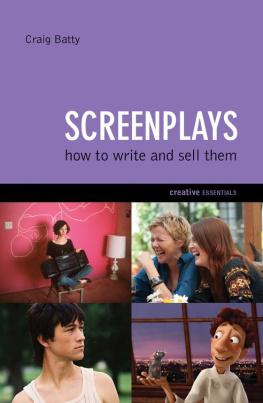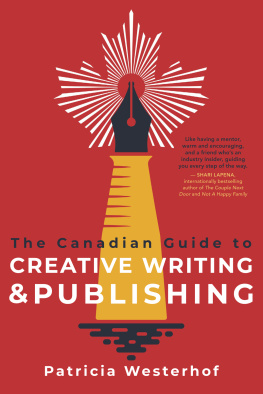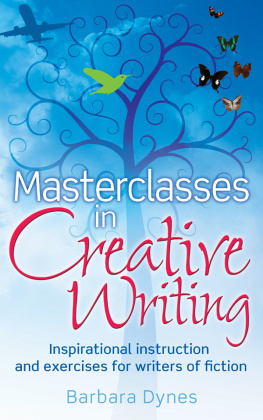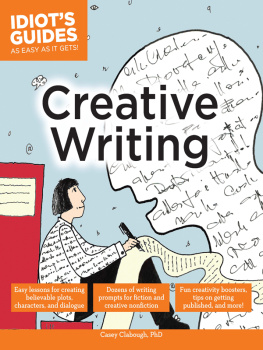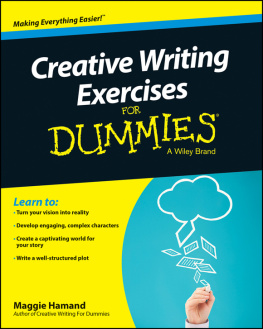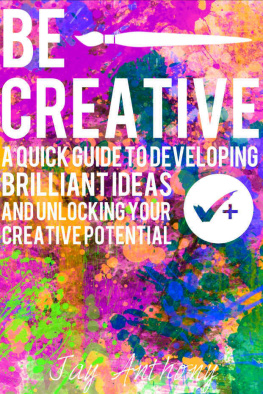To family, friends and students whove played their part in the making of this book. In particular, to RMIT students in the Anatomy of a Screenplay class, who were both insightful and inspiring. To Hannah for commissioning the book, and to Anne for doing a brilliant job editing it. To all the great screenwriters and filmmakers out there whove given me wonderful material to write about. And to all the books readers may it serve you well.
Oh no, not another screenwriting book! And thats just what I thought.
But then, when I thought about it some more, I realised we do need good screenwriting books; that, in fact, theres quite a shortage of them. While there may be hundreds on the market, few of them actually speak to the writer, telling them instead what they should and shouldnt be doing. Whats missing is a sense of conversation, a sense that the author knows what the writers trying to do, and so speaks to them in a way thats helpful and personal, as well as insightful.
I want this book to speak to you as a writer, to connect with what youre going through good or bad as you develop your screenplay, and to inspire you to move forward, helping you to find solutions that youre happy with and that you believe in. Above all, I want this book to be a guide that you come back to again and again, if not for help with a specific screenplay problem, then as a guilty pleasure perhaps reminding you that, yes, you do know what youre doing. And I use the word guide intentionally here. Its not a rule book. Nor is it a set of principles, techniques, tricks, tips, etc.
Over the last nine years, Ive worked with lots of screenwriters, student screenwriters, professional screenwriters, emerging screenwriters , and people who write screenplays as a hobby. Ive read lots of screenplays and screen ideas (treatments, outlines) at least a thousand and Ive discovered that I love working with screenwriters on their screenplays. Writing your own material is one thing and I love that, too but to work closely with someone on their idea is something else. Theres a buzz that comes from talking about characters, plots, themes, visual images and dialogue its like chatting to your friends about a film when you come out of the cinema, only better. Theres even more of a frisson when you can see the passion rising in a writer; when you can see them getting excited about their screenplay, and talking about it with much more verve. And heres the thing: the best buzz of all comes from seeing a writer suddenly make the leap into finding their own solutions. Theyve got what theyve been trying to achieve, and suddenly they fly. As a guide, a mentor, you get real satisfaction from this moment.
Ive also written a lot about screenwriting. Some of you might be familiar with my first book, Writing for theScreen: Creative and Critical Approaches (2008), which was written with Zara Waldebck. The response to that has been really positive. Not because were saying things that are explicitly new, but because we wrote it in a way that was intended to be helpful and inspiring. We touched on the idea of creativity, too, and how often in screenwriting training theres a lack of attention paid to the creative process its all about craft, technique and industry. Although these things are very important, theyre nothing without creativity. A screenwriter is a creative writer, after all. So we decided to follow this up with a second book, The Creative Screenwriter: Exercises to Expand Your Craft (2012). Quite different in tone and format, this book offers a plethora of creative writing exercises intended to deepen the screenwriters understanding of key aspects of screenwriting character, structure, theme, dialogue, pitching, developing ideas, etc. I also wrote the book Movies That Move Us: Screenwriting and the Power of the Protagonists Journey (2011), which, in essence, develops Christopher Voglers famous Heros Journey model to take into account both the physical and the emotional journey experienced by a protagonist. Theres quite a lot of theory in that book, but there are six case studies of famous films that highlight the points Im making. Vogler himself endorsed the book, which was very nice. I dont expect everyone to agree with my ideas how boring life would be if they did and I know that there will be things Ive missed or seen differently to others. But Im certain there will be something in this book that will connect with you; something that will make you see and understand screenwriting in a different way than before. Ill not see the recognition in your eyes the passion rising but Ill know its there.
So, I hope you find this book useful, and I hope you enjoy it. In the end, we write because we get pleasure from it. There are times when we utterly despise our art we cant get the plot right, the character doesnt sound right and nobody likes the screenplay but we only despise it because we love it so much. And, because we get so much joy out of it, we want it to be perfect, and we want others to enjoy it, too. Rather than seeing this book as a chore, then something youve got to read for university, or plough through to see where you might be going wrong try to relish working through the material. Let it guide your own thoughts and feelings about good screenwriting. Have fun thinking of your own examples. And, where it feels appropriate, enjoy having your own alternative readings, or the fact that you disagree with what Ive said!
A few years ago, when I was delivering a workshop on creativity at the London Screenwriters Festival, three men walked out. As they left, one of them mumbled something along the lines of, This is ridiculous creativitys got nothing to do with screenwriting. Maybe it was the way I was pitching it though Id only been talking for about five minutes but creativity and screenwriting not connecting? Being creative having nothing to do with screenwriting? Well, actually, this is a view that many people have. But its wrong. Screenwriting is creative writing. Its perhaps got more of a business slant to it than other kinds of fiction, but its still creative writing. And its through developing creativity that a screenwriter can make a film leap from being formulaic to formidable.
For those who stayed in the workshop about 40 of them we proved that, by thinking outside the box, ideas were strengthened and stories became more engaging and original. Some of the writers realised that their ideas had to be abandoned in favour of new ones that emerged but thats what its all about. After all, who wants to stick with an idea just for the sake of it, when theres a better one out there waiting to be tackled?
Nevertheless, a common perception is that screenwriting is driven by business. In one way, it is theres a lot of money involved usually, and many more people needed to make a film possible, which of course brings with it financial risks. The development of a screenplay also leans more towards the business-driven model, with more people vying for their voice to be heard, and more at stake when people like the director and financier get involved. All of this is important, and screenwriters should know about these kinds of factors, but that doesnt mean that creativity should be sidelined. Being a screenwriter is still about being creative. Its about having the ability to see things in different and interesting ways and, when the going gets tough, being able to find creative solutions to problems your problems or other peoples problems (which you might very well have to take on board).
Creative exercise
How are you creative? What does creativity mean to you? Thinking specifically about your life as a screenwriter however long it may be, or experienced you are make a list of all the things you do that youd categorise as creative. These might be decisions you make, or actions you take. When youve done this, make a list of all the things you do that youd categorise as business oriented. How does the list look? Are there clear connections between creative and business decisions and actions and if not, how might you try and connect them?

